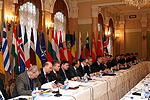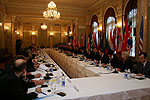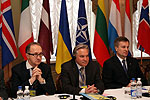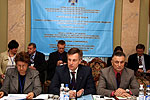Improving intelligence oversight in Ukraine
The civil democratic control of intelligence and security services was the theme of three events which took place in Kyiv, Ukraine, from 21 to 23 April. A parliamentary workshop, an intelligence expert working group and a human rights conference brought together parliamentarians, government officials and experts from Ukraine and over 20 NATO countries as well as representatives of civil society and international non-governmental organizations.
Parliamentary workshop
A workshop on “Practical Aspects of Parliamentary Oversight of Intelligence Services in Ukraine” was held in the parliament on 21 April. It was jointly organized by the National Security and Defence Committee of Ukraine’s Parliament (Verhovna Rada) together with the Geneva Center for Democratic Control of Armed Forces (DCAF) and the NATO Liaison Office in Ukraine.
Opening the workshop, National Security and Defence Committee Chairman Mr. Anatoliy Grytsenko highlighted that Ukraine’s Parliament needs the practical authority to live up to its new responsibilities under constitutional changes that took effect in 2006.
Mr. Anatoliy Kinakh, the former committee chairman and opposition representative, emphasized the importance of adapting Ukrainian legislation to European and international standards. He also underlined the value of experience acquired by those European states that recently became members of the European Union.
Parliamentarians, parliamentary staff, representatives of special services, and independent experts from Ukraine, Estonia, Poland, Romania, Slovakia and the Geneva Center discussed issues of mandate, scope, powers and responsibilities for Ukraine’s parliamentary sub-committee on intelligence oversight. Participants also discussed approaches for developing constructive relations between the parliament and special services regarding specific issues such as operations, investigation, budget, personnel, and regulating the secrecy regime.
NATO-Ukraine Working Group on Civil and Democratic Control of the Intelligence Sector
Experts from 15 NATO member states and representatives of Ukraine’s Security Service, Foreign Intelligence Service, Defence Intelligence, State Border Guard Service, and the National Security and Defence Council met on 22 April for the final meeting of the Working Group.
In his opening remarks, Acting Chairman of the Ukrainian Security Service (SBU), Mr. Valentyn Nalyvaichenko, highlighted the importance for Ukraine of developing a special service along a European model that can be a reliable partner for NATO member-states.
Experts reviewed the results of the Working Group’s activities over the past 18 months. Key achievements include improved transparency of Ukraine’s special services, additional training opportunities for civilian specialists, and positive contributions to the development of a Concept for Reforming Ukraine’s Security Service, which was recently approved by presidential decree.
The participants of the meeting have expressed their support to maintaining the mechanism of cooperation in the format of staff talks carried out at the request of Ukraine by a core group of volunteer nations. The Co-Chairs of the Working Group will report the results of the work to the NATO-Ukraine Joint Working Group on Defence Reform (JWGDR).
Mr. V. Nalyvaichenko also publicly announced his willingness to have a qualified NATO advisor to the SBU on civil and democratic control, who would be able to work on a permanent basis.
Human Rights Conference
A ground-breaking conference on 23 April brought together Ukrainian human rights activists, Ukrainian parliamentarians, non-governmental and international experts, and senior leaders from Ukraine’s security service in a conference dedicated to “Protection of Democratic Values and Compliance with Human Rights in the Activities of the Special Services”. The conference was co-organized by the Security Service of Ukraine (SBU) and the Geneva Center for Democratic Control of Armed Forces (DCAF).
The conference opened with a message from President Yushchenko, who underlined that the special services should be important tools for defending national interests, while at the same time rigorously adhering to protecting fundamental rights, personal freedoms, and democratic values. He emphasized that “with gratitude, we accept guidance and advice from those nations that already have taken the path.”
Conference participants extensively discussed the legal regulation of activities (like wiretapping) that restrict personal freedoms, and analyzed particular systems of civil and democratic control over such activities.
Participants, including members of the Security Service Civic Council, also examined the role of public organizations, media and the parliament in ensuring effective oversight. Acting Chairman of the SBU Mr. V. Nalyvaichenko noted that “employees of the Security Service of Ukraine are ready for meaningful reforms of the Security Service and to active civil control over its activities.” In this context, the conference discussed the importance of honest and transparent assessment of Soviet NKVD-KGB archives on political repression in order to underline the impermissibility of such actions in the future.
The conference agreed a set of recommendations for the Government, Parliament, Security Service and Civic Council that call for improved legislation, its effective implementation in practice, and active monitoring by civil society in accordance with international experience. Participants also supported the initiative of the SBU to make the conference an annual event.



